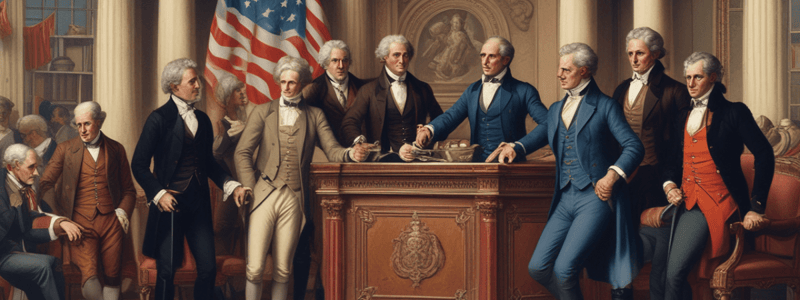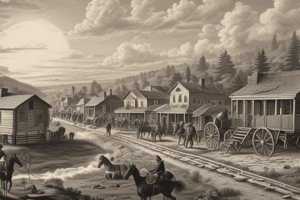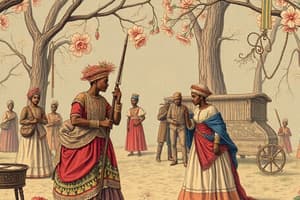Podcast
Questions and Answers
What was the primary economic base of the Southern states during the time of Andrew Jackson's administration?
What was the primary economic base of the Southern states during the time of Andrew Jackson's administration?
- Capital investment
- Agriculture fueled by slave labor (correct)
- Heavy industry
- Raw material extraction
Why did Western states seek an alliance with Southern states as mentioned in the text?
Why did Western states seek an alliance with Southern states as mentioned in the text?
- To reduce government corruption
- To strengthen their industrial base
- To increase agricultural productivity
- To lower protective tariffs (correct)
What was a key disagreement between Northern and Western interests according to the text?
What was a key disagreement between Northern and Western interests according to the text?
- The necessity of protective tariffs (correct)
- The need for more agricultural land
- The importance of international trade
- The expansion of heavy industry
Which region had economies primarily built on agriculture and raw materials, similar to the South?
Which region had economies primarily built on agriculture and raw materials, similar to the South?
Why did President Jackson initially stay out of the tensions between the North, South, and West?
Why did President Jackson initially stay out of the tensions between the North, South, and West?
What were the Western states' main reasons for seeking an alliance with Southern states in economic matters?
What were the Western states' main reasons for seeking an alliance with Southern states in economic matters?
What was a significant early rift between the North, South, and West mentioned in the text?
What was a significant early rift between the North, South, and West mentioned in the text?
What was the main issue that concerned the nullifiers regarding the federal tariff?
What was the main issue that concerned the nullifiers regarding the federal tariff?
What was President Jackson's stance on nullification?
What was President Jackson's stance on nullification?
What was the reason behind the growing concern in the South regarding the potential expansion of federal power?
What was the reason behind the growing concern in the South regarding the potential expansion of federal power?
How did the nullification crisis temporarily resolve?
How did the nullification crisis temporarily resolve?
What was the reason behind the personal animosity between Andrew Jackson and John C. Calhoun?
What was the reason behind the personal animosity between Andrew Jackson and John C. Calhoun?
According to the nullifiers, what gave a state the right to nullify federal laws?
According to the nullifiers, what gave a state the right to nullify federal laws?
Why did other slave states not support South Carolina's act of nullification?
Why did other slave states not support South Carolina's act of nullification?
What was the significance of Calhoun's resignation as Vice President and return to the Senate?
What was the significance of Calhoun's resignation as Vice President and return to the Senate?
Flashcards are hidden until you start studying




